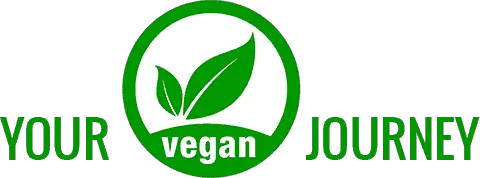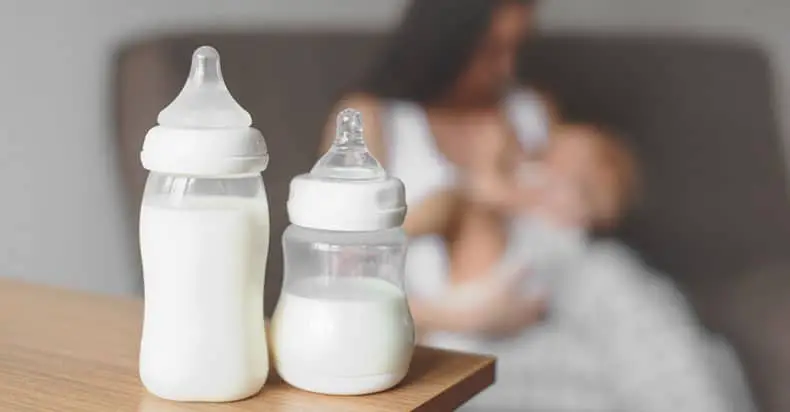By now we’ve covered countless food products in terms of what vegans can and can’t eat. Today’s question is unique because we’re looking at whether vegans can ethically breastfeed their infants. In discussing the answer to this question, we’ll be exploring the ethics of what we consume in a way that gets at the core of why we avoid meat, dairy, and eggs.
Breast milk is the only vegan form of milk. Vegan mothers who don’t breastfeed choose not to for the same reasons non-vegan mothers often decide not to breastfeed—e.g. medical issues, lack of support, scheduling difficulties—and not for animal ethics or environmental concerns.
So, let’s look at some of the reasoning as to why we shouldn’t worry about breastfeeding when it comes to ethics related to the vegan diet.
Why Breast Milk Is Vegan-Friendly
Breastfeeding Mothers Consent
Consent is the main difference between drinking human milk and the milk of other mammals. In the dairy industry, cows undergo “forced insemination” a euphemism for rape.
In factory farms, female cows live a miserable life enduring one forced pregnancy after the other, each time having their infants torn away, at which point their milk (meant by Mother Nature for the baby cow) is stolen only to be consumed by humans who have other cruelty-free options to choose from.
We don’t even have to imagine a woman undergoing the same process to get at the issue of consent. If a woman’s breast milk was taken against her will at any point it would render the milk non-vegan. It’s hard to imagine a situation where such a thing could happen, but it has.1-3
As vegans, we take up for non-human animals because they can’t speak for themselves. If a sheep or a cow was capable of communication meaningful to humans, it’s hard to imagine they‘d volunteer to donate their skin and milk, let alone endure the miserable life experience required to make such a sacrifice.
Don’t get me wrong, not all cows live on factory farms and I’m sure some live relatively happy and “humane” lives, albeit devoid of the dignity that should be available to all living beings.
But hey, we can indulge in a thought experiment. I can’t speak for the rest of the community, but if cows could talk, that could change things.
For example, a cow might say “Hey, I’ve got all this extra milk sitting around from my last calf (she was an orange juice kinda gal). Anyway, I’m throwing it all out unless you want it.”
In a situation like that, maybe cow’s milk could be considered vegan-friendly.
As silly as the example is, the point is clear: consent is what separates vegan-friendly from non-vegan-friendly animal-derived substances. That’s a lot of hyphens.
Until animals can communicate with us via language—and no, those bark interpreting machines don’t count—any use of their resources is non-vegan.
As sentient beings capable of reasoning and language, we can do what we want with our own bodily resources, whether it’s breastfeeding, donating organs, selling hair or donating it to locks of love, donating blood, etc.
In that vein, you may want to check out the article on vegan swallowing. It’s a deeper dive into the ethics of what separates something conscious/sentient from something that’s simply alive.
As mentioned above, there have been cases where breast milk was stolen for one reason or another. But those cases probably made the news because it’s a rare event. Anyone in dire need of breast milk can purchase the stuff or opt for infant formula. There are options.
This probably comes as no surprise, but babies are not in the habit of stealing the milk of mothers who choose not to breastfeed. Not only are they unable to, but there’s usually no need as the practice of breastfeeding is pretty popular overall.
This brings us to the next point.
Most Mothers Choose to Breastfeed
According to the CDC, 84.1% of infants are breastfed at some point.4
It’s one thing to say that someone simply gives permission, and another to say that they chose to take a certain action given otheroptions. Consent is often given begrudgingly in life. For example, folks often act in desperation, doing things they don’t want to do because they have no other choice.
No one is saying this is never the case with breastfeeding. And it is common for mothers to feel pressure to breastfeed when they don’t want to.5
But despite the discomfort and inconvenience, many mothers gladly decide to breastfeed because they want the best for their babies and most health organizations heavily recommend exclusive breastfeeding for months.6-9
I bring this up because, while there are societal pressures, most mothers choose to breastfeed for the sake of their baby. I.e. it’s not a profit-driven exploitative process. For the most part, the only breast milk that’s sold is donor milk. And they call it donor milk for a reason: it’s voluntary.
Breastfeeding Isn’t Bad for the Environment

Some folks adopt a vegan diet on strictly (or almost entirely) environmental grounds. They worry about sustainability and the impact that their food and lifestyle choices have on the environment.
Many who worry about the climate crisis think that we’d be a lot better off if we stopped having kids. Those who feel strongly that we should stop having babies altogether are often referred to as antinatalists, although this group has a number of problems with human procreation, the environmental impact being only one.
I’ve spent a lot of time in forums over the last few years reading the concerns of both ethical and environmental vegans. In that time I definitely encountered eco vegans who felt we shouldn’t procreate. But, I wouldn’t characterize the community as having that sentiment.
They’re mostly just concerned with the effects of animal agriculture on the environment (greenhouse gas emissions, etc.).
I know that’s just an anecdote, and the sentiment may be more widespread than I realize. But let’s say that it was a popular opinion in the vegan community that humans should stop having kids. This wouldn’t make breastfeeding non-vegan on the basis that it’s not environmentally sustainable.
If you’re at the point of needing to breastfeed, it’s because you already have a baby. If choosing to breastfeed would have any further environmental impact (compared to using infant formula), the difference is likely to be marginal.
The impact of the growing population on the environment is a conversation for another post. If you already have a baby, the important question is how you should proceed—a conversation that you and your doctor should have.
According to the CDC, the energy needs of someone breastfeeding only rises by 450-500 calories.10
So, someone normally needing 1,800-2,000 calories would need to bump it up to 2,300-2,500 when nursing. Even if the energy difference was more significant, nursing is only one of many factors that can affect energy needs.
Breast Milk Is Healthy for Human Babies
This is an important point because many vegans adopt the diet for strictly health reasons. In my experience, they tend to develop an interest in animal welfare over time, probably due to influence from other vegans.
Likewise, some folks who join the community due to animal concerns end up developing a real interest in nutrition after a while.
Anyway, you might have come to this article wondering whether breast milk is optimal for babies or if they’re better off with a plant-based formula.
I’ve never personally known a vegan to be so anti-milk that they went so far as to demonize breast milk. But, I can definitely see how someone might wonder in the back of their head if it is healthy.
If you’ve been consuming content on the nutritional benefits of plant-based diets for any length of time, then you’ve no doubt heard of the evils of dairy, particularly cow’s milk.
From the saturated fat to the lactose and animal proteins, dairy has several problematic nutrients and causes a number of problems in humans. It’s linked to heart disease, diabetes, allergies, you name it.
So, if these dangers extend to human milk, it’s understandable why a mother or mother-to-be might want to start looking for an alternative.
But, it’s important to know that there are several differences between breast milk and cow’s milk, both literally (they’re composed differently) and when it comes to human health.
Any negative health effects that breast milk could have on an organism don’t apply to human babies any more than the ills we humans suffer from cow’s milk apply to baby cows.
Above it was mentioned that milk contains lactose, saturated fat, and animal proteins. These nutrients are present in both human and cow milk, but in different quantities. While both are 88% water, breast milk is higher in carbohydrates (7% vs. 4.5%) and fat (4.1% vs. 3.9%), and lower in protein (1.3% vs 3.3%).11
And, to be sure, breast milk isn’t suitable for human health into adulthood.
It so happens that these nutrients are just what infants need during this stage of the lifecycle when packaged in the quantities found in breast milk.
Also, human breast milk contains omega 3 fatty acids, vitamins, minerals, and even antioxidants.12
As the researchers at NutritionFacts.Org point out, the opiate-like effects induced by milk proteins (which occurs in adults as well) promote bonding between infant and mother.13
One health concern that comes up from time to time is whether a vegan mother’s breast milk has the nutrients needed by the baby. I.e. whether vegans are typically nutrient deficient, and if so, should vegan mother’s breastfeed.
The main concern is vitamin B12. The CDC recommends B12 supplementation for lactating mothers on a strict vegan diet.14
The milk of a vegan mom can be severely B12 deficient which, when untreated, leads to deficiency in the infant, potentially causing many developmental problems.15,16
Fortunately, it’s an easy fix. With supplementation, a vegan can easily have higher B12 levels than a non-supplementing consumer of animal products.
Is Breast Milk Vegan? Conclusion
So, that sums it up. If you’re an ethical vegan wondering whether there’s any moral inconsistency in consuming animal products, regardless of the source, fear not. Veganism isn’t about legalism and a rote set of rules that apply in all cases. One has to use common sense.
Consent is what separates the use of human breast milk from the consumption of cow’s milk. Until animals can reason and communicate via language, any use of their resources is a form of theft—whether it’s cow’s milk, sheepskin, leather, or eggs.
There are a number of legitimate reasons a woman may choose not to breastfeed, be it a lack of resources or problems in lactation. While health organizations strongly recommend breastfeeding for the first 6 months, there are plenty of barriers to the process that make it impractical for some.
But those reasons should never include health concerns around the safety of milk for infants or ethical concerns common to the vegan community (animal ethics, the environment, etc.).
While I’ve heard many vegans voice concerns about overpopulation, I’ve never encountered anyone in the community who thought that breastfeeding itself was unsustainable.
As for health concerns, not all milk is created equal. What’s good for one species can be detrimental to another. Likewise, what’s healthy in one lifecycle may not be healthy in another—which is why milk is for babies and we adults should stick to soy and nut milks.
Provided a mother has adequate nutrition, her breast milk will be perfectly suitable to the infant’s needs. Like with many things in life, there’s a time and place for milk. Infants need the nutrients found in milk, and breast milk provides those nutrients in the right quantities and ratios.
Thanks for reading.
References
- Robbing the Cradle: One of My Colleagues Is Stealing My Breast Milk. Slate. https://slate.com/human-interest/2017/07/dear-prudence-one-of-my-colleagues-is-stealing-my-breast-milk.html
- Thieves Swipe Breast Milk From Woman’s Front Porch. https://sacramento.cbslocal.com/2017/11/09/breast-milk-bandit/
- Breast Milk Stolen In Bloomfield; Cops Probe Theft. https://patch.com/new-jersey/bloomfield/breast-milk-stolen-bloomfield-cops-probe-package-theft
- Key Breastfeeding Indicators of Infants Born in 2017, National Immunization Survey 2018-2019. https://www.cdc.gov/breastfeeding/data/facts.html
- The Pressure To Breastfeed Can Hurt Moms. And Doctors Are Finally Realizing It. The Huffington Post. https://www.huffpost.com/entry/breastfeeding-pressure-women-mental-health-doctor_l_5d811672e4b00d69059fc2d0
- Breastfeeding Recommendations and Benefits. The CDC. https://www.cdc.gov/nutrition/infantandtoddlernutrition/breastfeeding/recommendations-benefits.html
- What are the recommendations for breastfeeding? https://www.nichd.nih.gov/health/topics/breastfeeding/conditioninfo/recommendations
- American Academy of Pediatrics. Section on Breastfeeding. Pediatrics. 2012;129(3):e827-841. DOI 2011-3552. https://pediatrics.aappublications.org/content/129/3/e827
- Breastfeeding. The World Health Organization (WHO). https://www.who.int/health-topics/breastfeeding#tab=tab_1
- Maternal Diet: Do mothers need more calories while breastfeeding? https://www.cdc.gov/breastfeeding/breastfeeding-special-circumstances/diet-and-micronutrients/maternal-diet.html
- Summary of Differences Between Milks. http://tmrinternational.org/why-you-should-not-give-your-baby-cow-or-any-animal-milk/
- Tsopmo A, Friel JK. Human milk has antioxidant properties to protect premature infants. Curr Pediatr Rev. 2007;3:45–51. https://www.ingentaconnect.com/content/ben/cpr/2007/00000003/00000001/art00006
- Breast Milk, NutritionFacts.Org. https://nutritionfacts.org/topics/breast-milk/
- Vitamin B12: Do infants get enough B12 from breast milk? https://www.cdc.gov/breastfeeding/breastfeeding-special-circumstances/diet-and-micronutrients/vitamin-b12.html
- Krause’s Food & the Nutrition Care Process (Page 528). L. Mahan-Janice Raymond – Elsevier – 2017
- Roumeliotis N, Dix D, Lipson A: Vitamin B12 deficiency in infants secondary to maternal causes, CMAJ 184:1593–1598, 2012.

